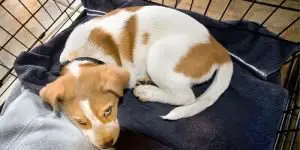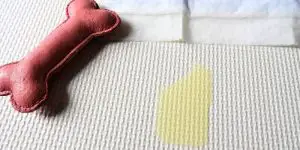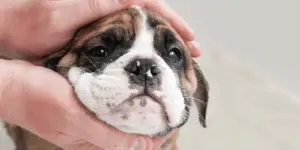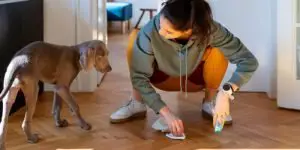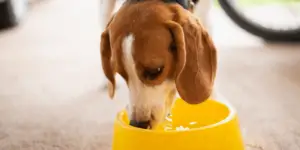
Why is my puppy peeing a lot?
- Written by Dr. Cristina Vulpe
- Last updated
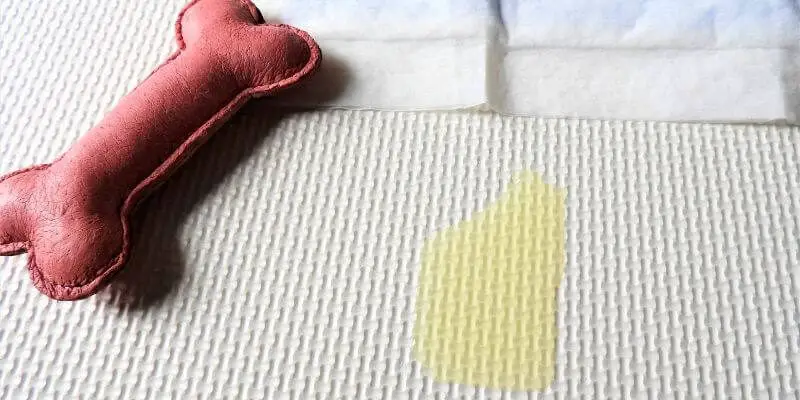
Puppy Peeing a Lot – Every 5 minutes, 10 minutes – What’s normal?
Its common for puppies that have small bladders to pee once every 10 to 30 minutes. However, a higher frequency than that should convince you to take your pup to the vet.
But what is too much when it comes to peeing? How often should a puppy pee in order for you not to feel concerned? Can frequent urination be caused by health problems? Read on to find out the answers to all of these questions.
In this article
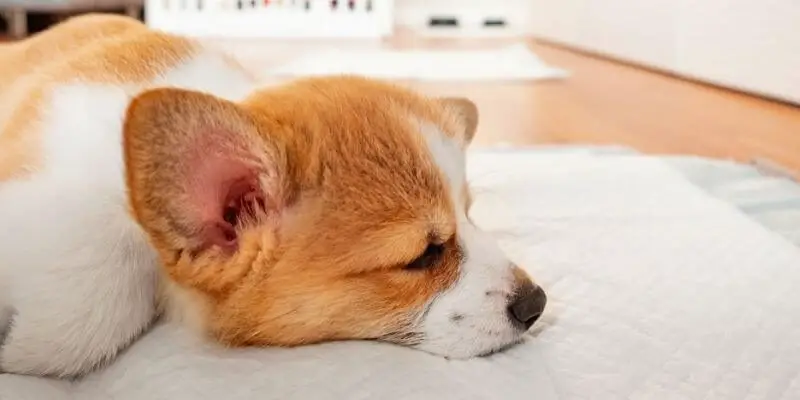
Why is my puppy peeing every 5 minutes?
If your pet is urinating once every five minutes, the likelihood that they are suffering from a medical issue is quite high. It’s rather normal for a puppy to pee once or even twice an hour or so, especially in the first weeks of their life.
Some dogs might have even smaller bladders, which might make them pee once every 10 to 30 minutes. However, a higher frequency than that should convince you to take your pup to the vet.
Drinking a lot of water can be one of the causes, especially if the puppy is feeling very warm. A urinary tract infection can be another cause, along with other health concerns, though.
Why is my puppy peeing every 10 minutes?
Frequent potty breaks are completely normal for young as well as small breed puppies.
But if your puppy is indeed ‘going to the bathroom’ once every 10 minutes and doing so repeatedly, they might also be urinating because of a health issue rather than because they’ve had a lot of water and they have a small bladder.
If your pet seems to urinate every 10 to 15 minutes, even when they are taking a nap, it’s time to go see the vet.
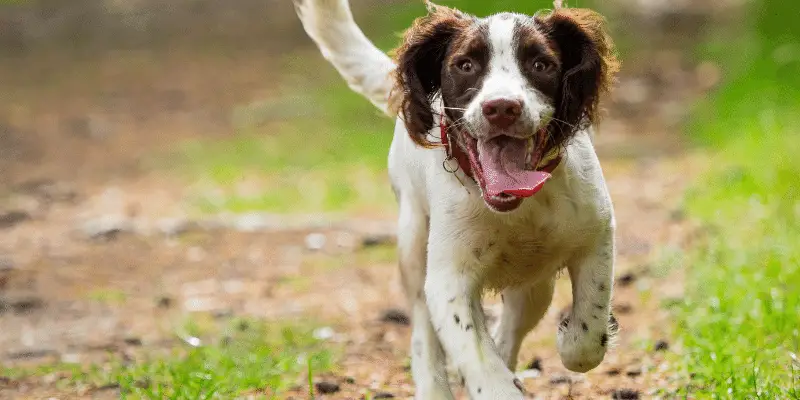
How often should a puppy pee?
The answer to this question is that it actually depends on the exact puppy’s age. When they are born, dogs do not have the best reflexes, and it takes a while for them to perfect them.
Very young dogs, such as those that haven’t been weaned and might have an age lower than 5-6 weeks, can urinate once or twice an hour or even more often than that. This is why raising a puppy is so taxing, after all.
By the time your dog is two months old, they should pee once every 2-3 hours. With appropriate training, they might begin to pee just 3-4 times a day by the time they are four months old, for example.

Puppy pee frequency week by week
| Puppy age | Explanation |
|---|---|
| 8 weeks old | Although by the time they get to be 8 weeks of age, you might think of your puppy as more grown-up, the truth is that they still don’t have the same bladder control as an adult. While they can hold it in for more than they used to when they were just 1-month-old, they should still feel the need to have a pee once every 2-3 hours. So, if your pet is peeing more often than that, veterinary assistance might be necessary. |
| 12 weeks old | Once every three hours is considered a normal peeing frequency for a 12-week-old puppy. By the time your dog ends up being 3-months-old, they should have gotten partially used to their potty break schedule. It’s not uncommon for a 12-week-old puppy to wee as many as 20 or 25 times per day, regardless of the amount of water that they had. Anything beyond that means a vet visit is due. |
| 6 months+ old | Most vets tend to agree that as per a 6-month puppy development schedule, dogs should urinate once every six to seven hours. Accidents can still happen, especially if your pet isn’t fully trained yet, but you should be able to organize your day as per that routine. A 6-month-old puppy should also be capable of sleeping through the night without needing to go outside and pee or use a pee pad. If your dog is urinating more often than that, they may have to be seen by a veterinarian. |
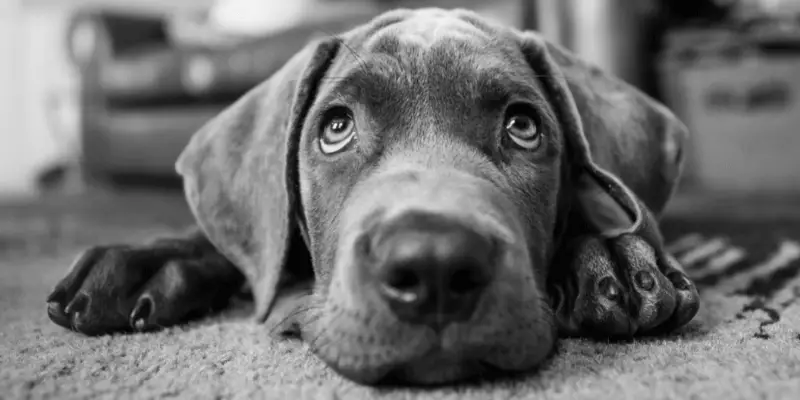
What can cause your puppy to frequently urinate?
You might think that the rate at which your dog pees is strictly a consequence of how much water a puppy drinks throughout the day.
And while that can indeed be a factor that can influence the frequency of urination, it is not the only one. Here are several others you should consider.
Incomplete training
Every dog has the instinct of marking their territory, so they might leave a couple of drops here and there, but puppies tend to pee everywhere if they haven’t been adequately trained.
Pups don’t know when and where they are supposed to go potty, so they might look at your home and think that it’s a giant toilet. If you have no experience and can’t seem to handle the task of house training, talk to your vet or a professional trainer who can give you guidance.
Anxiety
While puppies might not pee every five to ten minutes even when they’re experiencing unusual nervousness, those that are already anxious and are put in a troubling situation (such as a trip to the vet clinic) might indeed experience frequent urination.
However, this is something that stops almost immediately after they return to a safe environment, especially if they are house-trained properly.
Attention-seeking behavior
All puppies that do not get enough stimulation throughout the day and that are also young enough not to have complete control over their bladder might seek out entertainment opportunities such as getting your attention.
And while you are not going to be happy about your pup peeing in the wrong places or too often, that means that you’re still going to be paying them more attention. Play with your dog as much as possible (especially outdoors, once they are vaccinated) to make sure that this behavior is an uncommon occurrence.
Urinary tract infection
Your puppy can develop a UTI after coming in contact with a microorganism from the place they’ve peed in, for example. Female puppies are more likely to develop urinary tract infections, but males can get them on occasion, too.
Along with frequent urination, puppies might experience local pain and discomfort and an ongoing need to lick their nether region if they have this health condition.

Kidney infection
Although kidney infections can also be treated with antibiotics, time is of the essence in their case. Puppies can pee often because of this complication, but the amount of urine isn’t necessarily large.
Getting your pet seen by a vet is very important in the event of a kidney infection as otherwise, the organs might become severely damaged.
Bladder stones
While bladder stones can also lead to frequent urination, puppies will usually show other signs, such as the presence of blood in their pee, abdominal pain, and general malaise.
Kidney stones
Renal stones can be another cause of frequent urination, but since they are much harder to treat, they call for immediate veterinary assistance.
If they get dislodged from the kidney capsule and manage to block out your puppy’s ureter, your dog might lose their life in a matter of less than a couple of days.
Tumors
Depending on their exact location, some tumors might cause your pet to pee often. Naturally, all cancers of the urinary tract, whether the upper or the lower one, will influence your dog’s peeing habits.
But there’s also the possibility that cancer of a specific part of the nervous system might have been developed, such as the brain or the spine. In these locations, there are nuclei controlling your puppy’s reflexes, and if they become damaged in any way, you might see your pup peeing a lot.
Medications
Side effects are a reality of all medical drugs, and that’s something that all humans know. Changes in the pup’s peeing habits and urine in terms of quantity, smell, and color, can happen if your puppy is getting treated for a health condition.
However, if you have any questions in this sense, don’t hesitate to contact your veterinarian to find out if these side effects are normal or not.
Diabetes
Although less common in puppies, diabetes is a metabolic disorder that can affect all dogs whose pancreas is not functioning correctly. If your dog is diabetic, they will drink a lot of water, and as a result, they will pee a lot and frequently.
Diabetes can be congenital, which means that a number of puppies can be born with it. These days, it is a highly manageable condition once the dog is diagnosed.
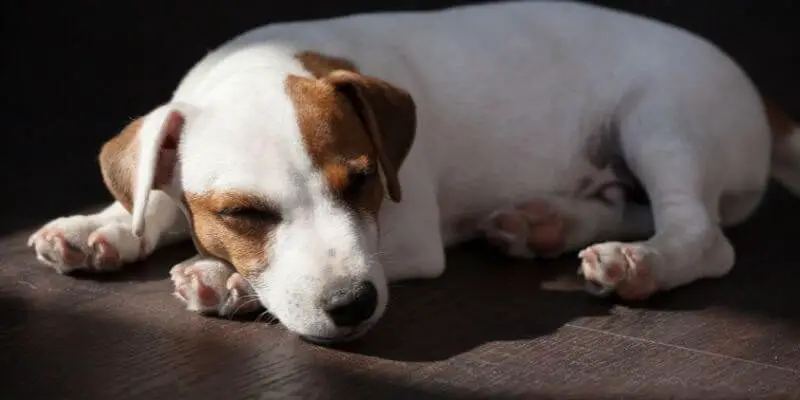
How to deal with frequent urination
Consult your vet
Going to the vet should be the first course of action strictly because when it comes to puppy health, time is always of the essence. Their health status can quickly degrade and they are much more sensitive compared to their adult counterparts.
Get rid of pee odors
When you clean your puppy’s accidents, you should not only use the right solutions for the task, but you should also do your best to remove your dog’s pee odor.
The reason for this is not only that you want your home to smell nice, but you also have to remove your dog’s scent. They might have marked that spot, so it’s important to get rid of it completely.
Increase walk time and lengthen their potty breaks
Even from the first time you walk your puppy, you should know that the longer you are outside, the higher the chances of your pet becoming used to going potty there – not inside your home.
When your pup is allowed to go outside, you should make potty breaks as long as possible, sometimes even upwards of two or three hours. As such, you’ll convince your pet to pee outdoors rather than indoors.
What to do if your puppy pees in their sleep?
Puppies can have bad dreams just like babies do, but peeing while they sleep can also happen because of medical reasons.
So the best course of action would be to take your pet to the vet whether you suspect a health problem or not.
We wrote a separate article about some of the reasons why puppies pee in their sleep and how to fix it, so you may want to give it a read.
References
- Prevalence and characterization of urinary tract infection in owned dogs and cats from Spain, E. Hernando et al, 2021 https://pubmed.ncbi.nlm.nih.gov/33484889/
- Insulin resistance in dogs, Rebecka S. Hess, 2010 https://pubmed.ncbi.nlm.nih.gov/20219491/
- The diagnosis of urinary incontinence and abnormal urination in dogs and cats, S. Silverman & C.D. Long, 2000 https://pubmed.ncbi.nlm.nih.gov/10768241/
- Inappropriate urination, Stephanie Borns-Weil, 2019 https://pubmed.ncbi.nlm.nih.gov/30591188/

Written by: Dr. Cristina Vulpe
Dr. Cristina Vulpe is a certified veterinarian who graduated in 2011 and earned her PhD in canine oncology in 2015, with a thesis focused on the diagnosis of abdominal tumors in dogs.


